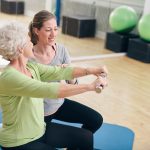 Physical activity has proven to be an effective way to combat weight gain in premenopausal and postmenopausal women– even in moderate amounts. Menopause signifies the end of a woman’s menstrual cycle as well as fertility. During this time the ovaries no longer produce estrogen or progesterone – two key female hormones.
Physical activity has proven to be an effective way to combat weight gain in premenopausal and postmenopausal women– even in moderate amounts. Menopause signifies the end of a woman’s menstrual cycle as well as fertility. During this time the ovaries no longer produce estrogen or progesterone – two key female hormones.
Menopause typically occurs naturally with aging, but it can also be a result of surgery or illness. Women generally enter menopause around the age of 51 but it can occur as early as 40. Menopause at 40 is commonly referred to as premature menopause. Menopause is largely a result of genetics, so it’s a good idea to look to your mother or grandmother if you want an idea of when it will happen to you.
Advertisement
After menopause a woman’s menstrual cycle stops, thus they stop having monthly periods. Menopause can also cause symptoms such as hot flashes or night sweats, which can make daily activities, and even sleep, quite challenging.
Menopause is divided into three stages: Perimenopause, menopause and postmenopause. In perimenopause menstrual cycles start to become irregular and hot flashes may begin to occur. Menopause is the signaling of the end of periods, after experiencing one full year without them. Once a year has passed without menstruation, a woman will then be in her postmenopausal stage.
Menopause and weight gain
 Maintaining your normal weight with the passing years becomes more and more difficult – even more so at menopause. It’s important to note that although it may be challenging to maintain normal weight during menopause, it’s not impossible. By paying closer attention to diet and physical activity, you can still maintain a healthy weight until postmenopause.
Maintaining your normal weight with the passing years becomes more and more difficult – even more so at menopause. It’s important to note that although it may be challenging to maintain normal weight during menopause, it’s not impossible. By paying closer attention to diet and physical activity, you can still maintain a healthy weight until postmenopause.
Weight gain usually occurs in menopause due to changes in hormones. Weight gain commonly occurs in the abdomen region, hips and thighs. But hormones aren’t completely to blame; aging can also make losing weight much more challenging, along with lifestyle habits and genetic factors.
Over time muscle mass decreases; unfortunately, muscle mass is necessary to maintain a healthy weight. Loss of muscle mass slows down the calorie-burning process, so if you continue enjoying those same old eating habits but don’t work to boost muscle mass, you will watch as the pounds pile on.
Other factors contributing to weight gain during menopause include stress, genetics, eating habits and exercise practices.
One thing that’s important to note about weight gain during menopause is that it can have health implications. Weight gain, in general and during menopause, can contribute to cardiovascular disease as well as diabetes. Due to the many health reasons associated with being overweight it is that much more important to maintain a healthy weight.
Study: Physical activity has greater impact on body composition in postmenopausal women
Researchers at the University of Massachusetts Amherst have found that even minimal physical activity can have a large impact on body composition in postmenopausal women. To further their findings, they also noted that postmenopausal women tend to have higher body mass indexes (BMIs), waist circumferences and body fat percentages. Although that news may be discouraging, the study offers hope that light physical activity can have a great impact on body composition. This means something as easy as tending to a garden can work wonders on reducing BMI, waist circumference and even body fat.
For the study 630 premenopausal women and 274 postmenopausal women were recruited. The women used ACTi Graph accelerometers to estimate the time spent doing physical activity compared to being sedentary. Results showed that postmenopausal women spent more time being sedentary. Other results revealed, unsurprisingly, that physical activity is associated with lower BMIs, waist circumferences and body fat percentages.
Lead author, Dr. Lisa Troy, said, “Across the board, for each measure of body composition, we found that light physical activity had a greater impact in postmenopausal compared with premenopausal women. We additionally found that sedentary behavior was more strongly associated with waist circumference in postmenopausal women. This is an important public health message because, as women go through menopause, physiological changes may decrease a woman’s motivation to exercise. What we’ve found in our study suggests that doing even a little bit of exercise may make a big difference in body composition.”
Dr. Wulf Utian from the North Americans Menopause Society added, “Regular exercise has so many benefits for women of all ages – from providing more energy and greater mobility to helping to build bone density. This study suggests, though, for postmenopausal women, weight management may be improved with a variety of physical activities.”
Physical activities to help reduce postmenopausal weight gain
 If you’re premenopausal, it’s important to start as early as possible to combat the effects of weight gain prior to menopause. Even if you are in menopause or are postmenopausal, the research suggests light exercise can still provide benefits. In any life-stage exercise and physical activity are important to maintain good health, so here is a list of physical activities you can enjoy to prevent postmenopausal weight gain.
If you’re premenopausal, it’s important to start as early as possible to combat the effects of weight gain prior to menopause. Even if you are in menopause or are postmenopausal, the research suggests light exercise can still provide benefits. In any life-stage exercise and physical activity are important to maintain good health, so here is a list of physical activities you can enjoy to prevent postmenopausal weight gain.
- Cardio – walking, jogging, biking, swimming, essentially anything that gets your heart pumping
- Strength training – because maintaining muscle mass is important for weight loss, can involve lifting weights or using a resistance band
- Yoga and meditation – these forms of physical activity are low-impact and can help reduce stress
- Dancing – a fun alternative to basic cardio exercises
- Elliptical or Stairmaster
- House work or yard work
- Zumba
Here are some specific exercises you can try as well.
Full body roll-up
- Lie flat on your back with arms overhead.
- Engage your core to bring up your arms and lift up your shoulders and back from the ground.
- Extend forward as if you were going to touch your toes.
- Roll back down to starting position.
Rolling like a ball
- Sit on the floor with knees bent, as if you were trying to make yourself into a ball.
- Roll back onto your shoulders – your feet should now be in the air.
- Roll yourself back up to starting position.
Double leg stretch with ball
- Lie on your back, shoulders elevated, knees bent, feet on an exercise ball.
- Extend arms above the head while extending legs forward – roll your legs on the ball to push it away from you.
- Contract arms and legs again and return to starting position.
Diet changes in the postmeopausal stage to control weight gain
 Along with exercise, diet also plays a role in weight gain. One study of 500 obese postmenopausal women found that when the women reduced their sugar intake, had fewer fried foods, consumed more fish, and ate out at restaurants less often – along with exercise – they lost weight successfully. The women also consumed fewer desserts, less sweetened beverages and increased their intake of fruits and vegetables.
Along with exercise, diet also plays a role in weight gain. One study of 500 obese postmenopausal women found that when the women reduced their sugar intake, had fewer fried foods, consumed more fish, and ate out at restaurants less often – along with exercise – they lost weight successfully. The women also consumed fewer desserts, less sweetened beverages and increased their intake of fruits and vegetables.
Here is a list of recommended foods for postmenopausal women.
- Fish
- Fruits, vegetables and whole grains
- Milk
- Ice tea – homemade tea, not the store bought variety with added sugar
Foods that postmenopausal women should avoid are:
- Wine
- Salt
- Caffeine
- Spicy and processed foods
- High-fat foods
Lifestyle changes and tips to take control of postmenopausal changes
The key to taking control of postmenopausal change is to make lifestyle changes because those are factors you have control over. Not only will lifestyle changes improve symptoms associated with menopause and postmenopause, but they can greatly aid in healthy weight management and improve overall health as well. Lifestyle changes include:
 Avoid smoking, caffeine, alcohol, salt, and sugar
Avoid smoking, caffeine, alcohol, salt, and sugar- Balanced diet
- Calcium for strong bones
- Vitamin D for strong bones
- Exercise
- Choosing proper fats – avoid saturated and trans fats whenever possible
- Sleep in a cool room
- Don’t wear too many layers – it can promote hot flashes
- Reduce stress
- Keep your cholesterol, blood sugar and blood pressure in check
Related Reading:
Insomnia risk in women higher during perimenopause: Study
A new study has found that insomnia risk in women is higher during perimenopause – the phase before menopause. It is a known fact that women are more likely to experience sleep-deprivation than men. It’s estimated that nearly 500 million women will go through perimenopause in the next decade. Continue reading…
Advertisement
Menopause lowers good cholesterol (HDL) protection, raises atherosclerosis risk
Menopause lowers high density lipoprotein (HDL) protection, increasing the risk of atherosclerosis in women. Atherosclerosis is the narrowing and hardening of the arteries as plaque builds up along their walls. Atherosclerosis can lead to coronary heart disease – responsible for one in three deaths of women. Continue reading…
Sources:
http://www.eurekalert.org/pub_releases/2015-10/tnam-pah101915.php
http://www.webmd.com/menopause/guide/menopause-information
http://www.everydayhealth.com/menopause/post-menopause
http://www.mayoclinic.org/healthy-lifestyle/womens-health/in-depth/menopause-weight-gain
http://www.prevention.com/fitness/strength-training/abs-exercises-and-belly-fat
http://www.webmd.com/menopause/news/20120828/keys-weight-loss-after-menopause
http://www.healthline.com/health/menopause/diet
